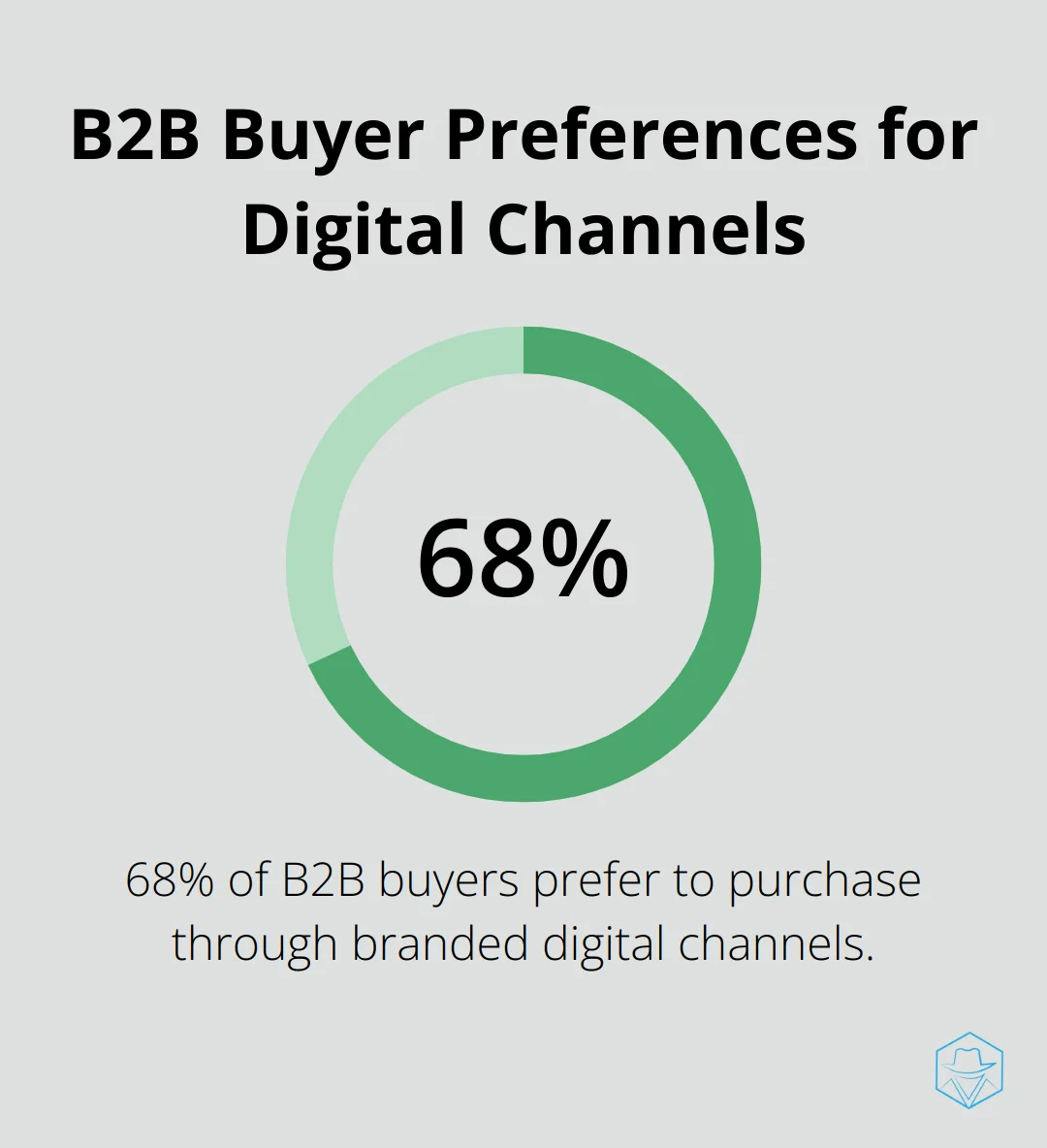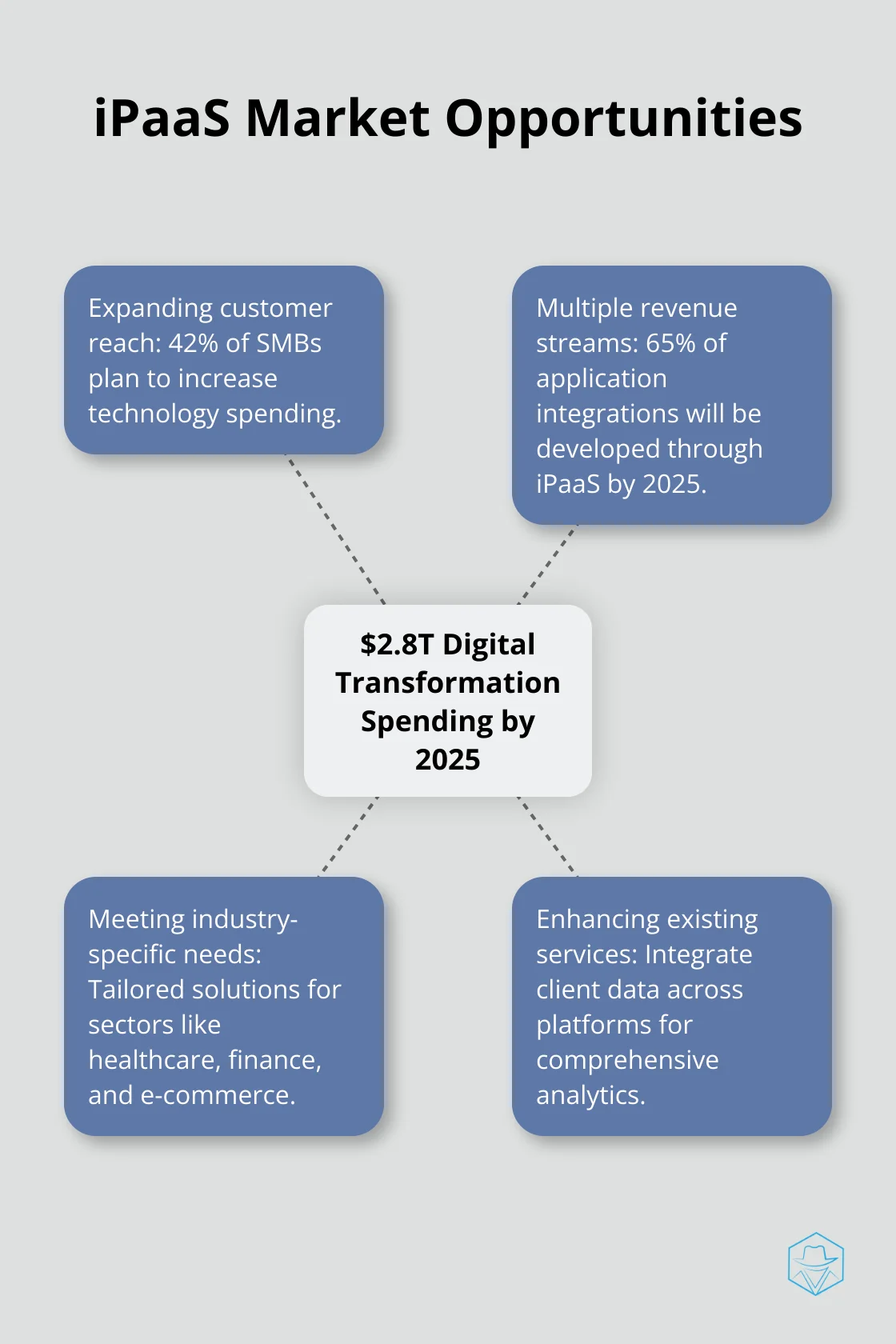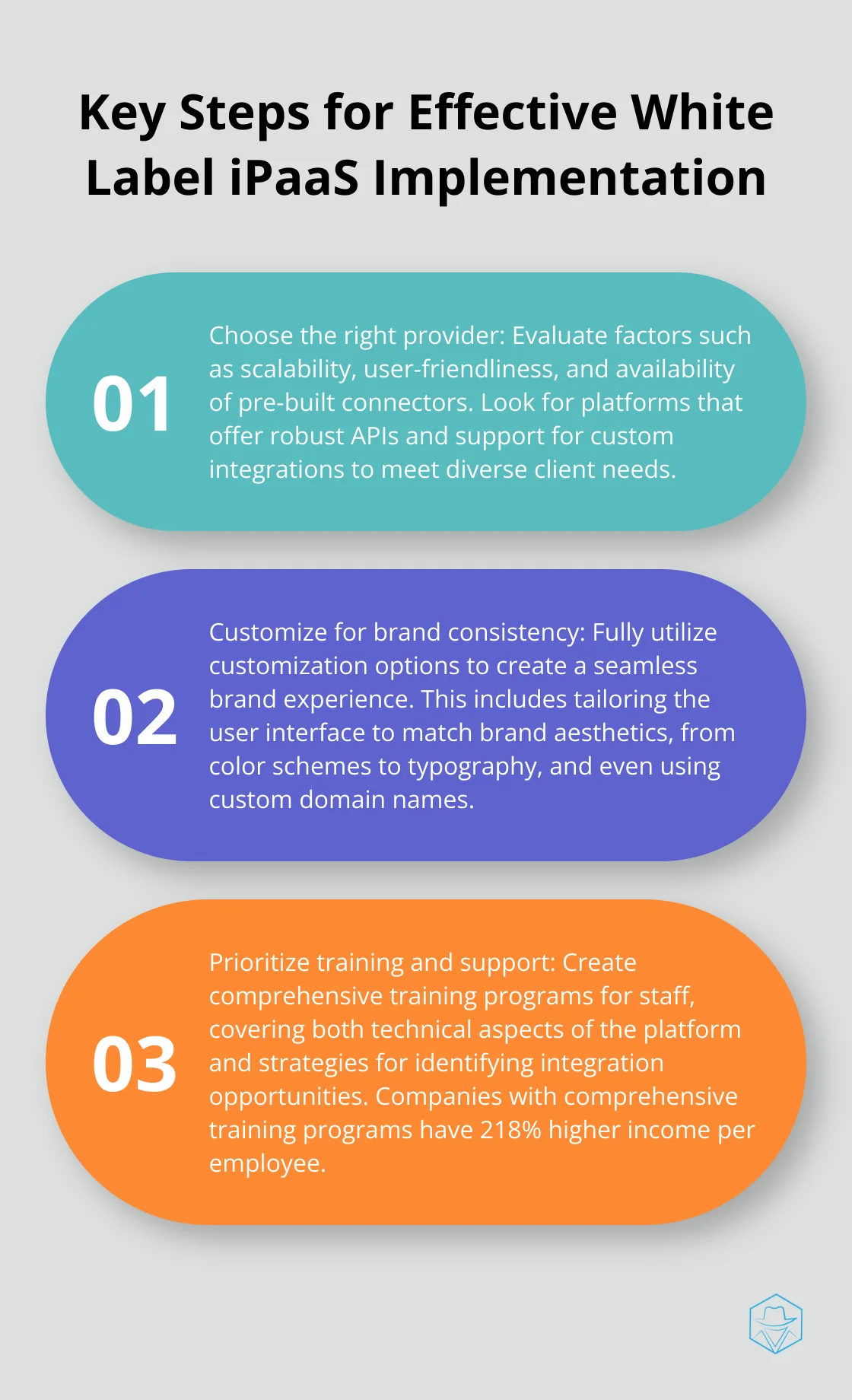White Label iPaaS: Opportunities for Service Providers

At Drop Cowboy, we’ve seen the transformative power of integration platforms as a service (iPaaS) in streamlining business operations.
White label iPaaS solutions are revolutionizing the way service providers deliver integration capabilities to their clients.
This blog post explores the opportunities and best practices for service providers looking to leverage white label iPaaS offerings.
We’ll dive into the benefits, market potential, and implementation strategies that can help you stay ahead in the digital transformation race.
What Is White Label iPaaS?
The Core of Integration Platforms
Integration Platform as a Service (iPaaS) has transformed business operations. iPaaS provides a cloud-based platform that connects various applications, data, and processes. White label iPaaS elevates this concept, allowing service providers to offer these integration capabilities under their own brand.
Customization: A Key Advantage
White label iPaaS solutions empower service providers to tailor the platform’s appearance. This includes adding your logo, color scheme, and even domain name to the interface. A recent Forrester study revealed that 68% of B2B buyers prefer to purchase through branded digital channels (a statistic that highlights the importance of consistent brand experience across all touchpoints).

Expanding Service Portfolios
White label iPaaS opens doors to expand service offerings without significant development investment. For instance, a marketing agency could add data integration services to their portfolio, offering more comprehensive solutions to clients. This expansion can lead to increased revenue streams and improved client retention rates.
Swift Deployment and Scalability
Unlike traditional iPaaS solutions (which often require extensive setup), white label iPaaS platforms are designed for quick deployment. Service providers can start offering integration services to clients in days, not months. These platforms also scale easily, handling growing client demands without substantial infrastructure investments.
Market Differentiation
Service providers who offer white label iPaaS solutions position themselves as one-stop shops for their clients’ integration needs. This comprehensive approach can set you apart in a crowded market. A Gartner survey found that 87% of business leaders consider digital transformation a priority. Providing tools to facilitate this transformation aligns your services with clients’ strategic goals.
White label iPaaS presents a powerful opportunity for service providers to enhance their offerings and meet the growing demand for integrated solutions. As we move forward, we’ll explore the specific market opportunities that white label iPaaS creates for service providers.
Seizing the iPaaS Market Potential
The Digital Transformation Boom
Digital transformation has become a business imperative. IDC forecasts worldwide spending on digital transformation to reach $2.8 trillion in 2025, signaling a massive opportunity. Service providers who offer white label iPaaS solutions position themselves perfectly to capitalize on this trend. These providers become indispensable partners in their clients’ digital journeys by supplying the tools businesses need to integrate systems and streamline operations.
Expanding Customer Reach
White label iPaaS unlocks access to previously unreachable customer segments. Small and medium-sized businesses (SMBs), often lacking resources for full-scale custom integrations, represent prime candidates for these solutions. A study by SMB Group revealed that 42% of SMBs plan to increase their technology spending in the coming year. Service providers can tap into this growing market and significantly expand their customer base by offering affordable, scalable integration solutions.
Multiple Revenue Streams
The power of white label iPaaS lies in its ability to generate diverse revenue streams. Beyond initial sales, ample opportunities exist for upselling and cross-selling. Service providers can offer implementation services, custom integrations, and ongoing support and maintenance. Gartner predicts that 65% of application integrations will be developed through iPaaS environments by 2025 (a shift that presents a golden opportunity for service providers to establish themselves as integration experts).

Meeting Industry-Specific Needs
Different industries have unique integration requirements. White label iPaaS allows service providers to tailor their offerings to specific sectors (such as healthcare, finance, or e-commerce). This specialization can lead to higher-value contracts and stronger client relationships. For instance, a service provider focusing on the healthcare sector could offer HIPAA-compliant integration solutions, addressing a critical need in that industry.
Enhancing Existing Services
Service providers can use white label iPaaS to complement and enhance their existing offerings. For example, a digital marketing agency could integrate client data across multiple platforms, providing more comprehensive analytics and insights. This addition not only increases the value of their services but also helps retain clients by becoming an integral part of their operations.
As the market for iPaaS continues to grow, service providers must understand how to implement these solutions effectively. The next section will explore best practices for choosing and deploying white label iPaaS solutions, ensuring maximum benefit for both providers and their clients.
Implementing White Label iPaaS Effectively
Choose the Right Provider
Selecting an appropriate white label iPaaS provider forms the foundation of successful implementation. Service providers should evaluate factors such as scalability, user-friendliness, and the availability of pre-built connectors. Platforms that offer robust APIs and support for custom integrations will help meet diverse client needs. (For example, Drop Cowboy’s platform provides extensive customization options and a wide range of integrations.)
Customize for Brand Consistency
Effective branding extends beyond logo placement. Service providers should fully utilize customization options to create a seamless brand experience. This includes tailoring the user interface to match brand aesthetics, from color schemes to typography. Even custom domain names can reinforce brand identity. A study by Lucidpress found that consistent brand presentation across all platforms can increase revenue by up to 23%.
Prioritize Training and Support
The success of a white label iPaaS offering depends on the team’s ability to implement and support it effectively. Service providers should create comprehensive training programs for their staff. This training should cover technical aspects of the platform and strategies for identifying integration opportunities and selling solutions to clients. The Training Industry Report states that companies with comprehensive training programs have 218% higher income per employee compared to those with less comprehensive training.
Develop Industry-Specific Solutions
While general-purpose integrations provide value, creating industry-specific solutions can set service providers apart from competitors. For instance, those serving the healthcare sector should focus on integrations that address HIPAA compliance and electronic health record (EHR) systems. MarketsandMarkets predicts the healthcare integration market will reach $6 billion by 2025, growing at a CAGR of 10.2%. Specialization positions service providers as experts in their clients’ industries, not just in technology.

Leverage Analytics and Reporting
Effective implementation of white label iPaaS includes robust analytics and reporting capabilities. Service providers should utilize these tools to demonstrate the value of their solutions to clients. Clear, actionable insights help clients understand the impact of integrations on their business processes. This data-driven approach can lead to increased client satisfaction and retention.
Final Thoughts
White label iPaaS solutions present service providers with a powerful opportunity to expand offerings, increase revenue streams, and meet the growing demand for integrated solutions. These platforms position providers as essential partners in their clients’ digital transformation journeys, offering tailored integration solutions that address specific industry needs. The future of the iPaaS market looks promising, with continued growth expected as businesses increasingly recognize the importance of seamless data integration.
Service providers who want to stay ahead in this competitive landscape must explore white label iPaaS options. These solutions allow providers to offer comprehensive integration services without extensive in-house development, enabling them to focus on delivering value to their clients. As the digital landscape evolves, those who adapt and leverage powerful tools like white label iPaaS will thrive in the market.
Drop Cowboy understands the importance of seamless integration in modern business operations. We encourage service providers to explore these solutions, understand their potential, and consider how they can integrate them into their existing service portfolios. The time to act is now-transform your business and deliver unparalleled value to your clients through white label iPaaS solutions.
blog-dropcowboy-com
Related posts

August 11, 2025
Voice mail drops
Boost engagement with voice mail drops. Learn effective strategies, benefits, and industry trends to enhance your communication efforts effortlessly.

June 16, 2025
What Are the Important SMS Marketing Best Practices You Need to Adhere To?
“How would SMS marketing benefit my business?” This question may linger in your mind as a business owner who wants to achieve great results. SMS (short message service) marketing involves sending messages to clients to promote your services or products. According to a report by Statista.com, 31% of marketing managers and business owners in the United States […]

May 8, 2025
Inbound Marketing Automation: Drive Organic Growth
Boost organic growth with inbound marketing automation tips, strategies, and tools. Enhance customer engagement and streamline your marketing efforts today!
![Navigating SMS Compliance Laws for Marketing Campaigns [Guide]](/blog/wp-content/uploads/emplibot/sms-compliance-hero-1755360409-600x400.webp)
August 19, 2025
Navigating SMS Compliance Laws for Marketing Campaigns [Guide]
Learn SMS compliance for marketing. Stay compliant, informed, and avoid penalties with our simple guide. Adjust your campaigns easily and effectively.

August 28, 2025
How AI is Transforming Message Personalization in 2025
Explore how AI message personalization enhances targeting, boosts engagement, and transforms strategies in 2025. Discover effective personalization tactics.

August 22, 2025
The Rise of AI in Messaging How It’s Changing the Game
Discover how AI messaging is transforming communication, boosting efficiency, and revolutionizing customer experiences across industries.